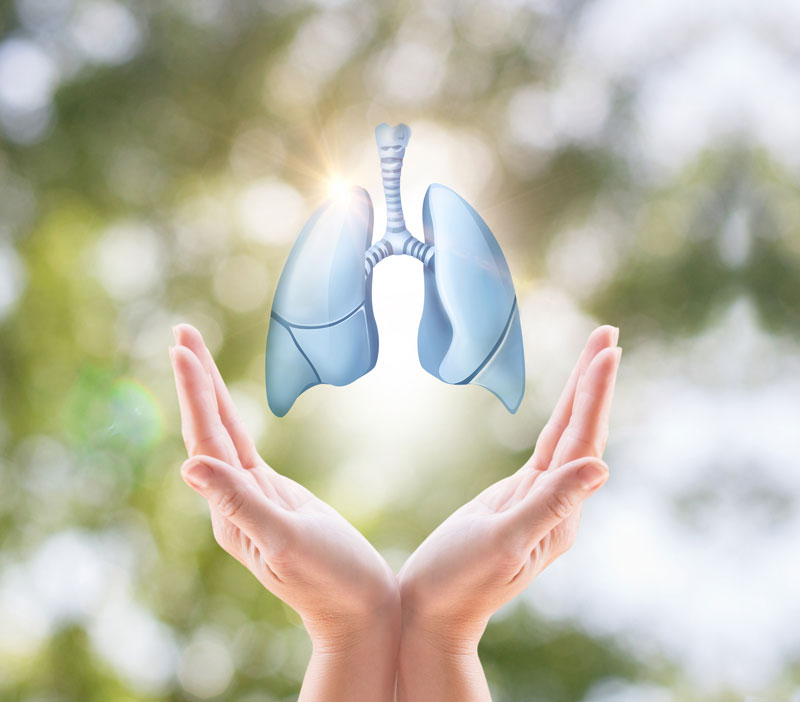Patient Education
What is Pulmonary Hypertension?
Pulmonary hypertension is a type of high blood pressure that affects the arteries in the lungs and the right side of your heart.
Pulmonary hypertension begins when tiny arteries in your lungs, called pulmonary arteries, and capillaries become narrowed, blocked or destroyed. This makes it harder for blood to flow through your lungs, and raises pressure within your lungs’ arteries. As the pressure builds, your heart’s lower right chamber (right ventricle) must work harder to pump blood through your lungs, eventually causing your heart muscle to weaken and eventually fail.
Pulmonary hypertension is a serious illness that becomes progressively worse and is sometimes fatal. Although pulmonary hypertension isn’t curable, treatments are available that can help lessen symptoms and improve your quality of life.
What is COPD?
When you breathe, air travels through tubes in your lungs—called airways—to millions of tiny air sacs. In a healthy lung, the airways are open and the air sacs fill up with air. Then the air goes quickly out.
COPD makes it hard to get air through the airways and into and out of the air sacs.
COPD includes two lung problems:
- “Chronic bronchitis” is increased cough and mucus production caused by inflammation of the airways. Bronchitis is considered chronic (or long-term) if a person coughs and produces excess mucus most days during three months in a year, for two years in a row.
- “Emphysema” is associated with damage of the air sacs and/or collapse of the smallest breathing tubes in the lungs.
What is Shortness of Breath?
Feeling short of breath can be an uncomfortable or frightening experience, especially if it has never happened to you before. It can be caused by problems with the lungs or with the heart, or by a low blood count, but its specific cause can sometimes take a while to pinpoint. Luckily, most causes of shortness of breath can be treated quickly once the cause is identified.
Many cases of shortness of breath are caused by simple, short lived problems, such as respiratory tract infections or allergies. The medical term for shortness of breath is dyspnea.
Very strenuous exercise, extreme temperatures, massive obesity and high altitude all can cause shortness of breath in a healthy person. Outside of these examples, shortness of breath is likely a sign of a medical problem. If you have unexplained shortness of breath, especially if it comes on suddenly and is severe, see your doctor as soon as possible.
What is Asthma?
Asthma is a chronic disease involving the airways in the lungs. These airways, or bronchial tubes, allow air to come in and out of the lungs.
If you have asthma your airways are always inflamed. They become even more swollen and the muscles around the airways can tighten when something triggers your symptoms. This makes it difficult for air to move in and out of the lungs, causing symptoms such as coughing, wheezing, shortness of breath and/or chest tightness.
For many asthma sufferers, timing of these symptoms is closely related to physical activity. And, some otherwise healthy people can develop asthma symptoms only when exercising. Staying active is an important way to stay healthy, so asthma shouldn’t keep you on the sidelines. Your physician can develop a management plan to keep your symptoms under control before, during and after physical activity.
Sleep Apnea – Overview & Facts
Obstructive sleep apnea is a common and serious sleep disorder that causes you to stop breathing during sleep. The airway repeatedly becomes blocked, limiting the amount of air that reaches your lungs. When this happens, you may snore loudly or making choking noises as you try to breathe. Your brain and body becomes oxygen deprived and you may wake up. This may happen a few times a night, or in more severe cases, several hundred times a night.
In many cases, an apnea, or temporary pause in breathing, is caused by the tissue in the back of the throat collapsing. The muscles of the upper airway relax when you fall asleep. If you sleep on your back, gravity can cause the tongue to fall back. This narrows the airway, which reduces the amount of air that can reach your lungs. The narrowed airway causes snoring by making the tissue in back of the throat vibrate as you breathe.





